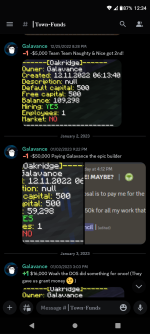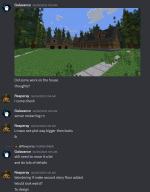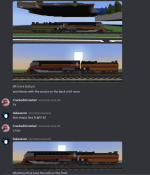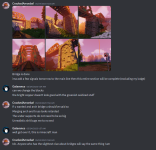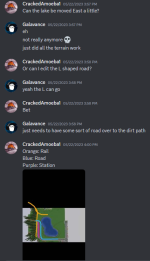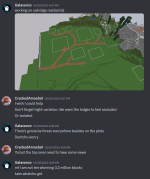Bibsfi4a
Citizen
Supporter
3rd Anniversary
Change Maker
Popular in the Polls
Legal Eagle
bibsfi4a
Solicitor
- Joined
- Mar 22, 2022
- Messages
- 199
- Thread Author
- #1
IN THE FEDERAL COURT OF THE COMMONWEALTH OF REDMONT
CRIMINAL ACTION
Commonwealth of Redmont
Prosecution
v.
Galavance
Defendant
COMPLAINT
The Prosecution alleges criminal actions committed by the Defendant as follows:
The Defendant proposed and passed an illegal law, against the Constitution of Oakridge. This action of a government official, which was inconsistent with their official duty, ultimately unfairly benefited the Defendant and their friend, CrackedAmoeba1.
I. PARTIES
1. Commonwealth of Redmont (Prosecution)
2. Galavance (Defendant)
II. FACTS
1. On June 24, 2023, Galavance proposed the law in Exhibit A, which would give Galavance $85,000 and give CrackedAmoeba1 $15,000.
2. On June 26, 2023, the law was passed and actioned, giving Galavance $85,000 and CrackedAmoeba1 $15,000 (Exhibit B).
3. This money was taken from Oakridge’s balance (Exhibit B).
4. The Constitution of Oakridge (Constitution - Town Constitution) states:
“The Town Council shall have the power to author, propose, and pass laws on any topic through a majority of its members with the only stipulations that such legislation may not conflict with laws passed by the Federal Government of Redmont and any bill which intends to modify this Constitution must abide by the process outlined in Article IV.”
5. The Constitution of Oakridge also states that the Mayor is part of the Town Council.
6. Thus, it is illegal, and thus inconsistent with the Mayor’s official duty, to pass a law that conflicts “with laws passed by the Federal Government of Redmont.”
7. The Wages Act (Act of Congress - Wages Act) states
III. CHARGES
The Prosecution hereby alleges the following charges against the Defendant:
1. One count of Corruption, for using their government position to benefit themself and CrackedAmoeba1, acting inconsistently with their official duty, and ignoring the rights of the people of Oakridge.
2. One count of Embezzlement, for withholding $85,000 for personal gain, when as the Mayor of Oakridge, they were entrusted with the balance of Oakridge.
IV. SENTENCING
The Prosecution hereby recommends the following sentence for the Defendant:
1. For Corruption, the maximum penalty of a $25,000 fine and 2 months barred from public office.
2. For embezzlement, the maximum penalty of a $50,000 fine, repaying $85,000 to the Oakridge town balance, and a suspension of the Defendant’s entrepreneur license until embezzlement is stricken from their criminal record.
EVIDENCE:


By making this submission, I agree I understand the penalties of lying in court and the fact that I am subject to perjury should I knowingly make a false statement in court.
DATED: This 5th day of July 2023.
CRIMINAL ACTION
Commonwealth of Redmont
Prosecution
v.
Galavance
Defendant
COMPLAINT
The Prosecution alleges criminal actions committed by the Defendant as follows:
The Defendant proposed and passed an illegal law, against the Constitution of Oakridge. This action of a government official, which was inconsistent with their official duty, ultimately unfairly benefited the Defendant and their friend, CrackedAmoeba1.
I. PARTIES
1. Commonwealth of Redmont (Prosecution)
2. Galavance (Defendant)
II. FACTS
1. On June 24, 2023, Galavance proposed the law in Exhibit A, which would give Galavance $85,000 and give CrackedAmoeba1 $15,000.
2. On June 26, 2023, the law was passed and actioned, giving Galavance $85,000 and CrackedAmoeba1 $15,000 (Exhibit B).
3. This money was taken from Oakridge’s balance (Exhibit B).
4. The Constitution of Oakridge (Constitution - Town Constitution) states:
“The Town Council shall have the power to author, propose, and pass laws on any topic through a majority of its members with the only stipulations that such legislation may not conflict with laws passed by the Federal Government of Redmont and any bill which intends to modify this Constitution must abide by the process outlined in Article IV.”
5. The Constitution of Oakridge also states that the Mayor is part of the Town Council.
6. Thus, it is illegal, and thus inconsistent with the Mayor’s official duty, to pass a law that conflicts “with laws passed by the Federal Government of Redmont.”
7. The Wages Act (Act of Congress - Wages Act) states
- “The Executive will maintain a guide on forums called 'Government Pay' that will list Government pay levels and their associated occupations.” and
- “The Executive has exclusive jurisdiction as to what salary level occupations fall into.”
III. CHARGES
The Prosecution hereby alleges the following charges against the Defendant:
1. One count of Corruption, for using their government position to benefit themself and CrackedAmoeba1, acting inconsistently with their official duty, and ignoring the rights of the people of Oakridge.
2. One count of Embezzlement, for withholding $85,000 for personal gain, when as the Mayor of Oakridge, they were entrusted with the balance of Oakridge.
IV. SENTENCING
The Prosecution hereby recommends the following sentence for the Defendant:
1. For Corruption, the maximum penalty of a $25,000 fine and 2 months barred from public office.
2. For embezzlement, the maximum penalty of a $50,000 fine, repaying $85,000 to the Oakridge town balance, and a suspension of the Defendant’s entrepreneur license until embezzlement is stricken from their criminal record.
EVIDENCE:
By making this submission, I agree I understand the penalties of lying in court and the fact that I am subject to perjury should I knowingly make a false statement in court.
DATED: This 5th day of July 2023.


